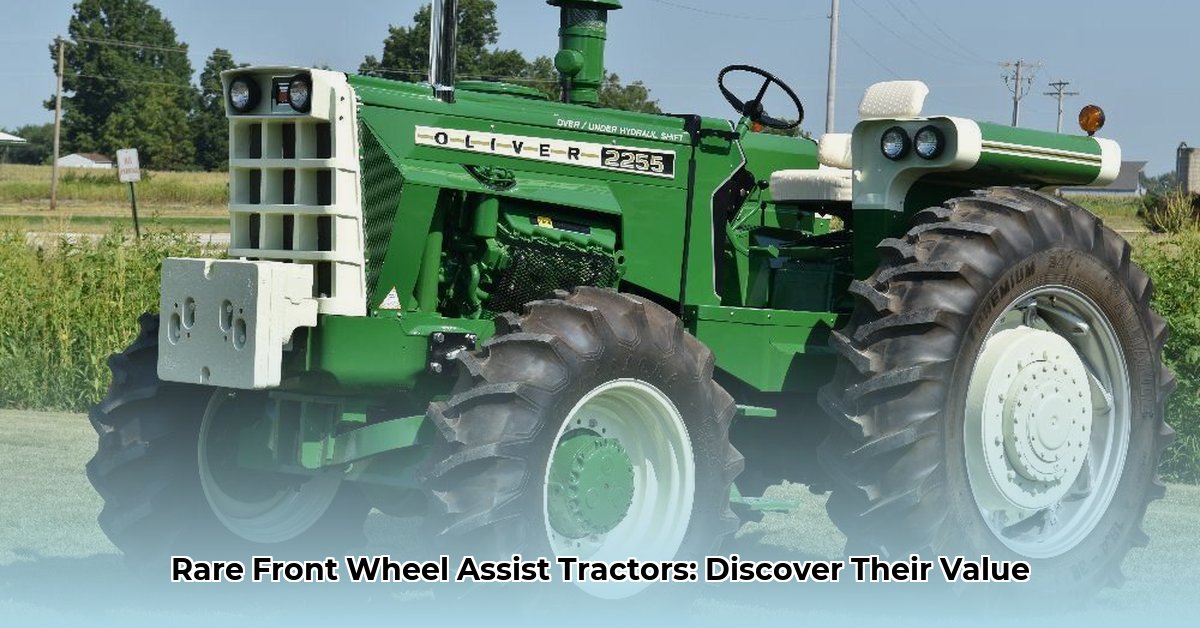
Front Wheel Assist Tractors: A High-Value Collector's Market
Classic tractors hold a special place in agricultural history, but those equipped with front wheel assist (FWA) systems are particularly prized by collectors. This isn't just nostalgia; FWA tractors offer a unique blend of power and maneuverability that sets them apart from standard four-wheel-drive models. Their rarity and the complexities of their mechanical systems contribute significantly to their value in the collector's market. But what exactly makes them so desirable, and how can you successfully navigate this specialized market? For more information on specific tractor models, check out this Case tractor database.
Understanding the Mechanics: Mechanical vs. Hydraulic FWA Systems
Early FWA systems relied on ingenious mechanical linkages – think intricate gears and levers transferring power to the front wheels. While robust, these systems lacked the smoothness and precision of later hydraulic designs. Hydraulic FWA systems, utilizing fluid pressure, offer a more refined driving experience and a wider range of operational control. However, this added sophistication also introduces potential points of failure that require careful consideration during restoration and maintenance. Which system is better? That depends on your priorities as a collector—mechanical systems often command higher prices due to their rarity, though hydraulic systems offer refined control.
A Collector's Market: Rarity Drives Value
The market for classic FWA tractors is surprisingly vibrant, driven largely by their limited production numbers. Rarity equates to higher value, mirroring the collector car market where limited-edition models fetch premium prices. Auction results consistently demonstrate impressive sums paid for well-preserved examples, particularly those from brands like Allis-Chalmers and Minneapolis-Moline. For instance, a meticulously restored Allis-Chalmers 220 recently sold for a price exceeding expectations. This highlights the escalating demand and the financial potential this niche market offers. But how do you separate the wheat from the chaff?
Navigating the Terminology Maze: FWA vs. Four-Wheel Drive
A common source of confusion lies in the often-interchangeable use of "front wheel assist" and "four-wheel drive." Understanding the distinction is crucial for successful buying and selling. FWA systems typically engage the front wheels only when needed, offering assistance to the rear wheels rather than providing constant four-wheel power. Four-wheel drive, on the other hand, delivers power to all wheels simultaneously. This difference impacts both performance and collectibility; clear understanding is paramount.
A Deep Dive into Brands and Models
Many manufacturers produced FWA tractors, including John Deere, Oliver, Minneapolis-Moline, Allis-Chalmers, and Massey Ferguson. Each brand boasts unique characteristics impacting collector value. This extends beyond brand reputation to features like engine type, the specific FWA system employed (mechanical or hydraulic), and even minor design details. Production numbers play a significant role—lower production runs generally mean higher collector value. Careful research into specific models is essential for informed decision-making.
Assessing Condition and Value: A Collector's Checklist
A comprehensive pre-purchase inspection is vital. This involves a detailed examination of the mechanical components, hydraulic system (if present), and overall condition. Cosmetic factors matter, but functionality is paramount. Remember, finding replacement parts for some models can be challenging, making the importance of the initial condition even more critical. It's also crucial to check for aftermarket modifications, which can significantly reduce a tractor's value.
Market Trends and the Future: A Long-Term Investment?
The collectible FWA tractor market shows signs of continued growth, driven largely by rarity. However, it’s important to acknowledge the costs associated with maintenance and restoration. The limited availability of comprehensive market data makes precise price predictions difficult. Long-term success requires careful planning, diligent research, and, ideally, consultation with experienced collectors and restoration specialists. What will the future hold for FWA tractors? That's a question that only time can answer.
Actionable Insights: Tips for Collectors, Suppliers, and Restorers
Here are key strategies for various stakeholders in the classic FWA tractor market:
- Collectors/Investors: Conduct thorough pre-purchase inspections; join collector clubs to share knowledge and resources; preserve and restore your finds meticulously; diversify your investments to minimize risk.
- Parts Suppliers/Restorers: Stock parts for popular and historically significant models—and consider the use of 3D printing technologies to reproduce rare parts; create detailed restoration manuals, making this arcane knowledge more accessible.
- Museums/Historical Societies: Acquire representative examples of FWA tractor technology; develop educational resources to share this history with the public; curate exhibitions highlighting the engineering innovation and agricultural significance of these tractors.
Risk Assessment: Potential Pitfalls
While rewarding, collecting FWA tractors presents several potential challenges:
- Part Scarcity: The availability of appropriate parts is often a significant limitation; explore creative solutions such as 3D printing or careful part reproduction.
- Mechanical/Hydraulic System Failure: These systems are complex; regular maintenance and preventative measures are essential.
- Confusing Terminology: Clear communication is vital; consult authoritative sources for clarification.
- Overpaying: Diligent research is paramount; avoid emotional buying decisions.
Key Takeaways:
- Classic FWA tractors are rare and valuable collector's items.
- Identifying genuine FWA systems requires careful examination and documentation.
- Understanding mechanical and hydraulic systems is crucial for assessment.
- Expert advice and thorough research are essential.
In conclusion, the world of classic FWA tractors offers a fascinating blend of engineering, history, and investment potential. With careful research, informed decisions, and a passion for these magnificent machines, collectors can embark on a truly rewarding journey.